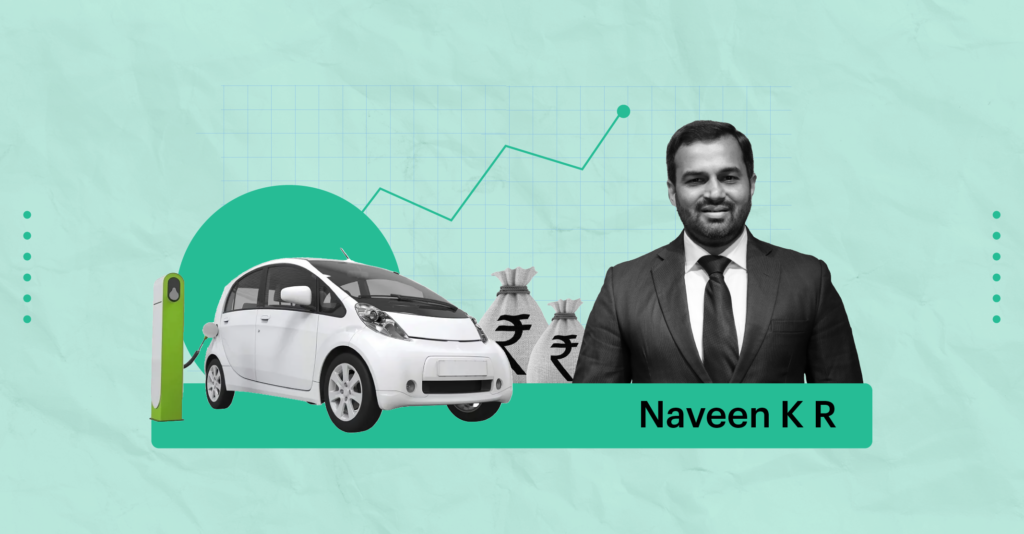Last Updated on Feb 9, 2023 by
No matter whether you live in Bangalore or Bhopal, it’s hard to miss the growing number of shiny green-plated vehicles. Currently, there are 13.9 lakh EVs (Electric Vehicles) on Indian roads, and by 2030 this number is expected to increase to 4.5-5 cr. Additionally, the EV industry’s market size is expected to grow to $7 bn by 2025 from an estimated $2 bn in 2023.
The Indian government targets EVs as 30% of the total vehicles by 2030, pushing the electric mobility industry towards exponential growth.
With EVs, times are changing for good. So, let’s understand why the Indian government is keen to promote EVs.
Table of Contents
The growing demand for EVs
- Curbing greenhouse gases – The transportation sector accounts for ~9% of India’s greenhouse gas (GHG) emissions. India has committed to reducing GHG emissions per unit of GDP by 33-35% by 2030. This global commitment may not be fulfilled unless India replaces Internal Combustion Engine (ICE) vehicles with EVs at scale.
- Cutbacks on crude oil – During the FY 2022, India’s spending on oil imports doubled from $62.2 bn to $119 bn. Oil and petroleum imports account for ~20% of India’s import bill – which can be significantly reduced with the adoption of EVs.
- A solution to air pollution – According to the World Bank, air pollution levels in India are among the highest in the world. This poses a heavy threat to the country’s health and economy. According to Lancet, air pollution is estimated to have caused 17 lakh premature deaths in India in 2019.
Government policies fuelling the growth of EVs
In April 2015, the Indian government launched the FAME scheme (Faster Adoption and Manufacturing of (Hybrid and) Electric Vehicles in India) to promote the demand for EVs and establish the charging infrastructure required for EVs.
The scheme offers various demand and supply-side incentives to encourage the development of the electric mobility ecosystem. Some of these demand-side incentives include subsidies on EV purchases, exemptions on registration fees, and income tax deductions on EV loans. On the supply side, several state governments have introduced exemptions on stamp duties and provided subsidies on purchasing land for EV production.
Top EV stocks to watch in 2023
- Mahindra and Mahindra Ltd
Mahindra & Mahindra (M&M) is one of the leading EV manufacturers in India – with a 67.4% market share in the electric 3-wheeler space as of September 2022. The company also plans to expand into the electric passenger vehicle segment with the help of its Born Electric portfolio. In September 2022, M&M announced five new EVs for the Indian market, four of which will be launched between 2024 and 2026.
The company plans to invest $1 bn in developing its EV portfolio and building its state-of-the-art EV platform, INGLO. INGLO is a modular platform used to manufacture M&M’s EVs. By 2027, the management expects to sell 2 lakh E-SUVs or have 20-30% of its total sales from E-SUVs. This will translate to 12,000 to 17,000 units a month in sales volume.
M&M has also received approval to establish an Rs. 10,000 cr. EV-manufacturing facility in Pune and is in talks to develop more such units across the country.
- Tata Power Company Ltd
Tata Power is one of India’s largest power utility companies, operating in both renewable and non-renewable energy.
The company is also a market leader in the EV charging infrastructure segment. Its EV-charging network is spread across 475 cities with ~23,000+ home chargers, 3,000+ public chargers and 242 e-bus chargers – making it a clear leader in the EV-charging points race. As of September 2022 ending quarter, the company’s EPC (Engineering, Procurement, Construction) order book for new energy projects stood at 15,000 cr.
- Amara Raja Batteries Ltd
Amara Raja Batteries is a leading manufacturer of automotive and industrial batteries.
EVs use lithium-ion batteries for energy storage. Hence, the company recently announced the incorporation of a subsidiary establishing a multi-gigawatt-hour lithium-ion cell manufacturing facility. Amara Raja intends to establish a domestic ecosystem to support the local manufacturing of lithium-ion batteries. For the same, a research and manufacturing facility will be set up in Telangana. Over the next ten years, the company intends to invest Rs. 9,500 cr. in this business.
The company has also created a portfolio of 0.5Kwh to 21.0Kwh products catering to India’s e-mobility and energy storage applications. It has also successfully developed high-voltage lithium-ion battery packs for e-mobility applications. The company expects to generate Rs. 1,000 cr. in revenue from the EV segment in FY 2023.
- Sona BLW Precision Forgings Ltd
Sona BLW Precision Forgings is an automotive systems and component manufacturer. It has nine manufacturing facilities across India, Mexico, China, and the USA, serving passenger and commercial vehicle manufacturers.
In the September 2022 ending quarter, the company clocked an all-time high quarterly revenue of Rs. 660 cr., despite the impact of the geopolitical situation in the EU and the COVID-led slowdown in China. You can check out the revenue and other financial metrics on the Tickertape Asset Pages.
The company derived 21% of its total revenue from battery EVs last quarter. The company’s net order book stands at Rs. 20,500 cr. Most of the order book (Rs. 14,000 cr.) is from the EV segment. The company currently has 37 EV-driven orders from 23 customers and added Rs. 400 cr., to the EV order book during the September 2022 quarter.
- Greaves Cotton Ltd
Greaves Cotton is a diversified engineering company that provides powertrain solutions and manufactures generator sets, farm equipment and electric vehicles.
Since FY 2020, the company has been increasing its focus on the EV business. The company earned just Rs. 37 cr from its electric mobility business in FY 2020, which was only ~2% of total revenue. By the first half of FY 2023, the contribution from the EV business had grown to Rs. 699 cr, making up 44% of the total revenue.
The company’s EV business includes both electric 2-wheelers and 3-wheelers. While the company sold 51,794 electric 2-wheelers (e2w) during FY 2022, it has already sold 59,660 e2w during the first half of FY 2023. The company has invested Rs. 700 cr. to setting up an EV-manufacturing plant with a 2.4 lakh capacity at Ranipet, Tamil Nadu.
- KPIT Technologies Ltd
KPIT Technologies is a software company focusing on building software solutions for the automotive sector. It operates in segments such as autonomous driving & ADAS (Advanced Driver Assistant System), electric & conventional powertrains, diagnostics, connected Vehicles, AUTOSAR (Automatic Open System Architecture), and vehicle engineering.
Ten of the world’s top 15 OEMs are already clients of KPIT. Top automotive OEMs are rapidly shifting to CASE (Connected, Autonomous, Shared and Electric) vehicles, providing KPIT with an opportunity to be a leader in the EV software solution space.
In FY 2022, electric & conventional powertrains contributed a significant 39% to the total revenue of Rs. 2,477.2 cr. In late 2022, Renault group onboarded KPIT as a strategic technology partner to provide electrification, autonomous driving, and connected vehicle for Renault consumers.
KPIT has strengthened its EV market position with its strategic acquisitions and partnerships. In January 2022, the company also teamed up with the dSPACE team to aid the testing and development of technologies involved in the electric vehicle charging process. Most recently, KPIT acquired the Technica group, which provides electric and electronic vehicle architecture. Using Technica’s expertise, KPIT can become a one-stop shop in helping the auto industry migrate to Software-defined Vehicles (SDV).
In a nutshell
Electric mobility is no longer the future; it’s the present. With rising environmental awareness and significant government push, the EV industry is growing exponentially. Investors can choose to invest in the emerging EV sector to make significant returns in the long run.
This article is written by Naveen of Windmill Capital. Click here to check Windmill Capital’s smallcases.
- Momentum Investing: How To Manage Risk? - Nov 6, 2023
- The Impact of Interest Rates on Real Estate Investments - Jul 19, 2023
- A Look into the Future of India’s Logistics Landscape - May 5, 2023




